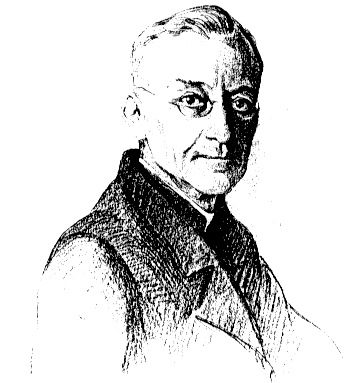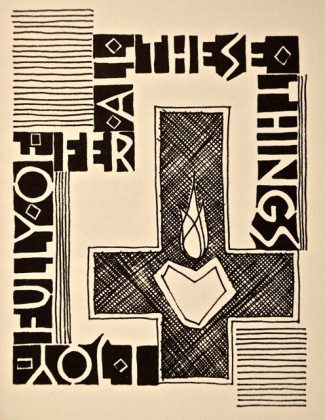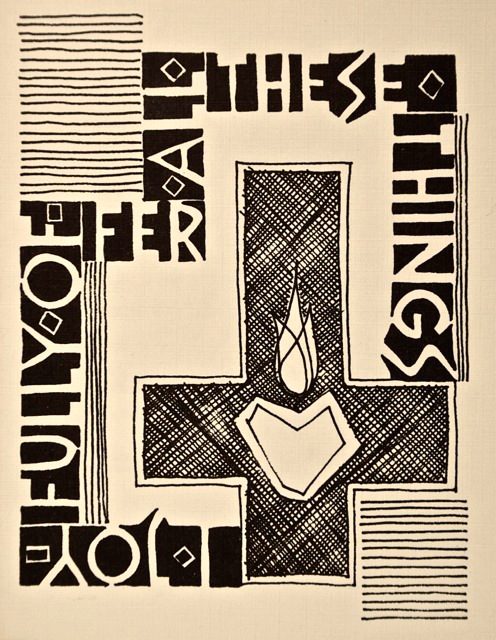“…take my soul into your most sacred wound, so that in this school of love, I may learn to make a return of love to God, who has given me such wondrous proofs of his love.”
Line 1
Each week David Schimmel, our province director of Dehonian Associates, will post reflections and prayers on the “Dehonian Spirituality” page of the website. See previous weeks’ reflections under the various headings on the left side of the Dehonian Spirituality page or use the drop-down menu at the top of this page under “Dehonian Spirituality.”
POSTED: April 4, 2014
 At 69 years of age, Fr. Leo John Dehon noted in his diary that he had always wanted to wear something associated with penitence, like a hair shirt, “but for the past twenty years my health obliged me to wear a brace that is both hard and embarrassing.” A year later, he continues the thought. “I see very well that it is necessary to practice mortifications, vigils, and fasting in order to arrive at contemplation. For me, these mortifications are imposed upon me by Providence: I have little sleep during the night; an infirmity obliges me to wear a painful brace; the conditions of my stomach make me undergo various privations. What remains for me to do? To profit well by all this, to supernaturalize it all, and offer it to the Sacred Heart.”
At 69 years of age, Fr. Leo John Dehon noted in his diary that he had always wanted to wear something associated with penitence, like a hair shirt, “but for the past twenty years my health obliged me to wear a brace that is both hard and embarrassing.” A year later, he continues the thought. “I see very well that it is necessary to practice mortifications, vigils, and fasting in order to arrive at contemplation. For me, these mortifications are imposed upon me by Providence: I have little sleep during the night; an infirmity obliges me to wear a painful brace; the conditions of my stomach make me undergo various privations. What remains for me to do? To profit well by all this, to supernaturalize it all, and offer it to the Sacred Heart.”
At 72, he acknowledges, “Old age has come. Fiat!” For Fr. Dehon, this single word was enough to recall the entire Latin phrase, meaning, Let it be done to me according to God’s word. He continues, “All is well when God wills it. Two religious communities asked me to preach their retreat for them. I cannot do that anymore. Chronic bronchitis often makes me cough up blood. I can no longer give retreats, where I must speak four times everyday for eight days! It hurts to be forced to refuse the exercise of the apostolate. I want so much to work for the reign of our Lord!”
After one particularly stressful night, he soberly admits, “My life is not going to last much longer. I thought I was dying last night. I had a violent attack of bronchitis, without being able to break up the congestion. I was suffocating, I was strangled. I believe little more was needed and it all would have been finished. The infirmities of old age are a daily reminder. All the organs weaken. It is a worn out ship that will sink one of these days.” Yet, Fr. Dehon lived ten years longer.
His last year of earthly life began “with some sufferings: a fall, a bad sprain, a general over-fatigue. Why not? Have I not much to expiate before ending my life; and have I not offered myself as victim to the Sacred Heart for his reign and for souls?” Although his tired body prayed with Paul, “I want to be gone and be with Christ” [Philippians 1:23], he immediately felt the presence of temptation. “Could that perhaps be an illusion; could I lose my heaven?” Yet just as quickly he professed, “I do not believe it. Most Sacred Heart of Jesus, I trust in you!”
 When a devout, young man, who kept all the commandments, approached Jesus to ask, “What must I do to inherit eternal life?” he heard an answer that saddened him. Jesus, looking at him with love, advised that in giving away his many possessions, he would have treasure in heaven. Unwilling to do that, the young man walked away. Listening to this exchange, Peter wondered aloud, “Look, we have left everything and followed you. What then will we have?” Jesus assured him that he would inherit eternal life and receive a hundredfold of everything he left behind. [Cf. Mark 10:17-30]
When a devout, young man, who kept all the commandments, approached Jesus to ask, “What must I do to inherit eternal life?” he heard an answer that saddened him. Jesus, looking at him with love, advised that in giving away his many possessions, he would have treasure in heaven. Unwilling to do that, the young man walked away. Listening to this exchange, Peter wondered aloud, “Look, we have left everything and followed you. What then will we have?” Jesus assured him that he would inherit eternal life and receive a hundredfold of everything he left behind. [Cf. Mark 10:17-30]

Echoing this story, the Rite of Religious Profession prays, “Father, all powerful and ever-living God, we do well always and everywhere to give you thanks through Jesus Christ our Lord…(who) consecrated more closely to your service those who leave all things for your sake, and promised that they would find a heavenly treasure.” A blessing for the professed religious highlights the essential attitude accompanying this offering, by praying, “May the Lord enable you to travel in the joy of Christ as you follow along his way.”
The image to the right, designed for a celebration of final profession of vows with the Priests of the Sacred Heart, incorporates a stylized version of a formerly used profession cross along with the sentiment, “I joyfully offer all these things.” As a visual statement of oblation, it reveals the attitude of offering one’s entire self to God’s will. The heart, aflame with love, joyfully endures and eventually overcomes the cross of daily trials, even those of aging. Difficult at times, surely, but a total self-offering that always basks in the loving gaze of Jesus.
 “As I think about aging, I recognize it intellectually, after having reached my 75th birthday last October. But often, my spirit, my heart block this reality. At the same time, my body will tell me something very different: diminishment of energy, resilience, and resourcefulness. Also I am quite content, not having many ministerial responsibilities and that now, I can say yes or no to requests.
“As I think about aging, I recognize it intellectually, after having reached my 75th birthday last October. But often, my spirit, my heart block this reality. At the same time, my body will tell me something very different: diminishment of energy, resilience, and resourcefulness. Also I am quite content, not having many ministerial responsibilities and that now, I can say yes or no to requests.
“I am pleased to live in an SCJ retirement community where there is a good schedule, which affords other retired SCJs like myself, opportunities for communal and personal prayer, shared meals, and time to socialize as well. Having spent over 20 years in Franklin, WI, I have a good local support group as well.
“Most of my life I have felt in control of the outcomes in my life. But now as I am aging, I am not in control of my agenda as much as I am learning it’s the Lord’s agenda that is more important. As a recovering addict, it’s best for me to turn my will and life over to God’s care and to live my life one day at a time.
“Aging is giving me the opportunity to reflect on my life and give thanks to the Lord. There is a saying about someone having a “silver spoon” when it comes to the kind of life they have had. I tell folks the “silver spoon” went to gold, then to platinum, and now the spoon has some diamonds on it. Sure, as I age there are still failures, mistakes, sins, but I can now own them, make amends when necessary, and learn from them.
“I am a son of Fr. Dehon and as I age, his two mottos, Ecce Venio (I Come To Do Your Will) and Adveniat Regnum Tuum (Thy Kingdom Come) are what keep my journey going.”
Tony Russo, SCJ, Sacred Heart Retirement Community, Franklin, WI
ony Russo
ony Russo
What is your experience of aging? How might you turn the irritations and limitations of aging into an act of self-offering? How might you turn temptation into an opportunity to profess an act of faith? What can you claim as gifts of the aging process?
sso
ony Ru
In your kindness throughout the coming week, please remember in your prayer all retired SCJs and all the residents of Sacred Heart at Monastery Lake Retirement Community in Franklin, WI.
Breath Prayer
At different times throughout life, prayer can be a struggle. The simplicity of breath prayer has the advantage of building upon an involuntary bodily function. Even if you’re tired, distracted, ill, or in a bad mood, you keep breathing.
Like most people, you probably breathe shallowly, and when prompted to take a deep breath, you suck in and tighten your stomach muscles. To be able to fill your lungs, however, you need to relax and extend your stomach muscles to allow your diaphragm to lower and give your lungs room to expand and fill with air. You can easily monitor your breathing by placing one of your hands on your stomach so that you can feel your stomach muscles extending, not contracting, as you take a deep breath. Try to inhale slowly though your nose and exhale slowly through your mouth. Breathing in this gentle and rhythmic manner may seem at first uncomfortable. Yet very quickly, deep breathing becomes a calming, peaceful ritual. Since breath is God’s gift of life, the conscious act of breathing can, in itself, be a wordless prayer.
To begin this practice, however, a few, accompanying sentiments might be helpful. For example, following your breath you can pray, “I breathe in God’s love for me; I breathe out my love for God’s people.” In time, you can shorten this to, “God’s love for me; my love for people,” and then simply, “Love; love.” Eventually, even this word is no longer needed.
You can practice breath prayer for as little time as you have or for as long as feels comfortable. Gradually, you will grow more conscious of your breathing throughout the day and discover how easy it is to pray always. Here are some sentiments to help you begin.
I breathe in God’s love for me; I breathe out my love for God’s people [or for a spouse, child, friend, someone who is ill or in need].
I breathe in God’s gifts to me; I breathe out my intention to share these gifts.
I breathe in God’s forgiveness; I breathe out my resolve to forgive.
I breathe in God’s grace; I breathe out my desire to live gracefully.
I breathe in God’s presence; I breathe out my wish to embody God’s presence.
I breathe in God’s healing; I breathe out my healing words and deeds.
I breathe in God’s total gift of self in Jesus; I breathe out my total gift of self to God.




